Three quarters of Britain’s councils have seen a 100 per cent explosion in the rate of asylum seekers over the last decade.
One has even witnessed a 600-fold increase, MailOnline analysis suggests.
For every 10,000 residents in Northumberland, Government statistics show nearly 21 are now asylum seekers. The same authority housed just one in 2014, when modern records began, a rate of 0.03.
The full results of our investigation can be viewed in our interactive map, which lays bare the true situation in your council.
Home Office data shows that 110,000 asylum seekers – the equivalent of a town the size of Cheltenham, Worthing or Oldham – were being housed across the UK by the end of 2024.
Fuelled by an explosion in small boat crossings, the cost of accommodating them has tripled to £4.2million a day. Nearly 40,000 are currently kept in hotels.
Yet critics say they are not evenly spread out, with 59 of 361 councils accommodating none.
MailOnline calculated the rate of asylum seekers per 10,000 residents between 2014 and 2024. From here, we were able to calculate the percentage increase.
Dozens of councils were excluded because they either did not exist a decade ago or housed no asylum seekers.
Of the 209 authorities with comparable figures, 157 (75 per cent) saw rates double.
MailOnline’s analysis, however, understates the true scale of the issue because a further 95 councils which existed in 2014 are now taking asylum seekers where they weren’t previously.
Behind Northumberland, in terms of the biggest percentage increases, came Cheshire West and Chester (17 per 10,000) and Halton (63 per 10,000), although they both only housed tiny numbers a decade ago.
Hillingdon is the UK’s asylum seeker hotspot, figures reveal, with the overwhelming majority staying in hotels.
Eighty-nine out of every 10,000 residents in the West London borough were asylum seekers at the end of December – or one in every 112.
Although the vast majority of areas have seen an increase in numbers from 2014, 26 councils now support fewer asylum seekers.
Home Office policy is to disperse them around the country, and officials say they are not given a choice as to location and the accommodation.
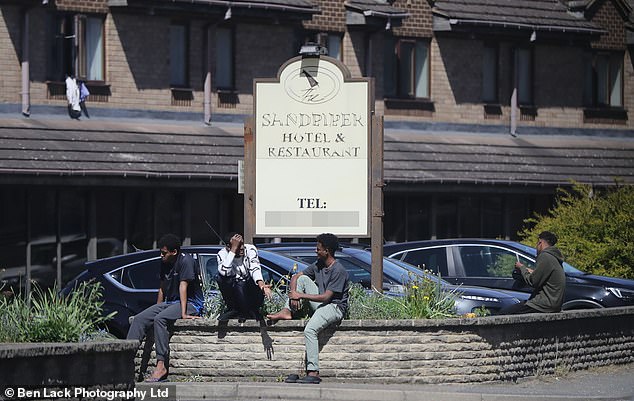
The Sandpiper Hotel, just outside historic Chesterfield in rural Derbyshire, has been used to accommodate asylum seekers for around two years
Ministers are working towards ‘a fair and equitable distribution’ across the UK’.
MailOnline’s analysis only looked at asylum seekers given a Section 95, which is a Home Office categorisation of support to those asylum seekers who appear to be destitute.
This categorisation accounts for 90 per cent of the total currently living in Britain.
But it means that thousands given accomodation under two different laws aren’t included in our data when broken down by council. This was done to make a comparison over time fairer.
The topic of where asylum seekers are housed has been a huge topic of controversy.
In the Runcorn by-election, where Reform narrowly beat Labour by six votes, both parties promised to close a 425-bed hotel in the constituency that was being used by the Home Office to house asylum seekers.
Locals in the Cheshire town claimed crime had increased in the area since it started housing asylum seekers in 2020.
Residents in Hartlepool, Swansea and Coventry railed against the negative consequences of the influx, saying it has heaped pressure on housing, GPs and dentists.
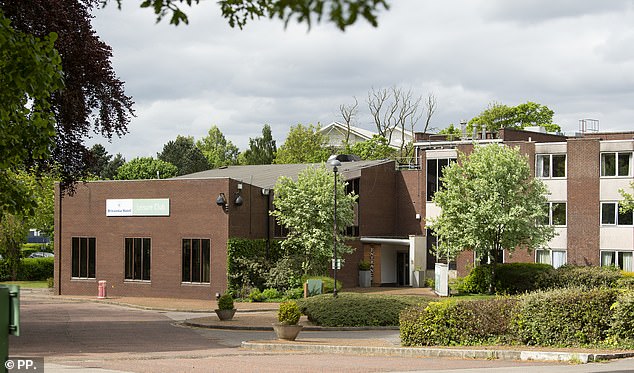
The Daresbury Park hotel in Runcorn which is being used to house asylum seekers. Both Labour and Reform promised to close it in the recent by-election

On Thursday, May 1, Labour was dealt a devastating defeat when Reform overturned their 14,000 majority to take Runcorn by just six votes, which saw Sarah Pochin become Reform UK’s latest MP. She is pictured with party leader Nigel Farage
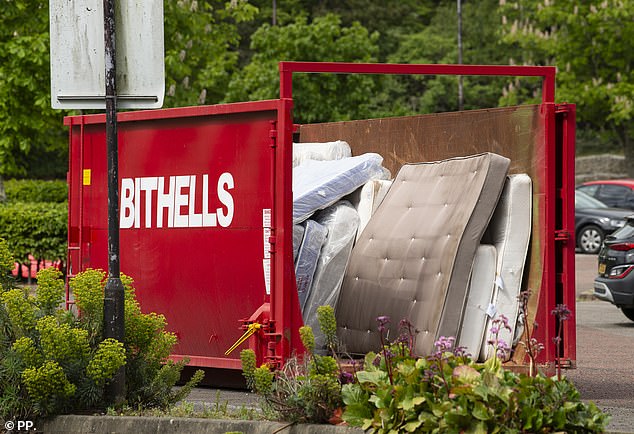
New and old mattresses lie in a metal container outside the Daresbury Park hotel
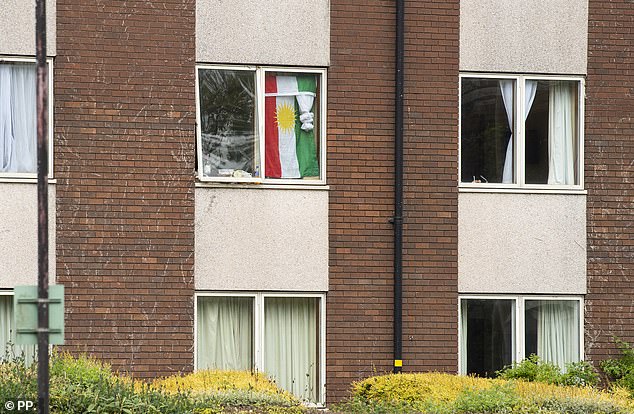
A Kurdistan flag can be seen draped in the windows of one of the hotel rooms
While Wethersfield has a population of 707 people, the Home Office plans to boost the number of migrants at MDP Wethersfield to 800.
Those living nearest the base, previously the Ministry of Defence Police (MDP) HQ, and before that a WW2 RAF and US airbase, said their houses are now unsellable.
As well as getting free accomodation, asylum seekers are also entitled to UK taxpayer-funded NHS healthcare, prescriptions, dental care and children under 18 are required to go to school (where they may be able to get free meals).
If their accommodation provides meals each person gets £8.86 per week, this rises to £49.18 per week if no meals are provided.
Extra money is also provided to pregnant mothers and young children.
Robert Bate, of the Centre for Migration Control said: ‘There’s a real feeling of injustice across the country, not just that we are spending billions of pounds on housing and supporting these individuals, but that cut corners mean it is working class communities disproportionately bearing the brunt of this system’s failures.
‘Tranquil and tight-knit neighbourhoods are being transformed by the stroke of a Whitehall pen, imposing large numbers of unvetted young men into their midst, straining public services and housing whilst increasing the insecurity that many people, especially women and girls, feel whilst walking their own streets.’
More than 108,000 individuals applied for asylum in the UK during 2024 – the highest annual number ever recorded.
Yet half were refused at the initial decision.
Britain’s small boats crisis has fuelled the growing toll, with tens of thousands having trekked across the channel seeking a better life since 2018.
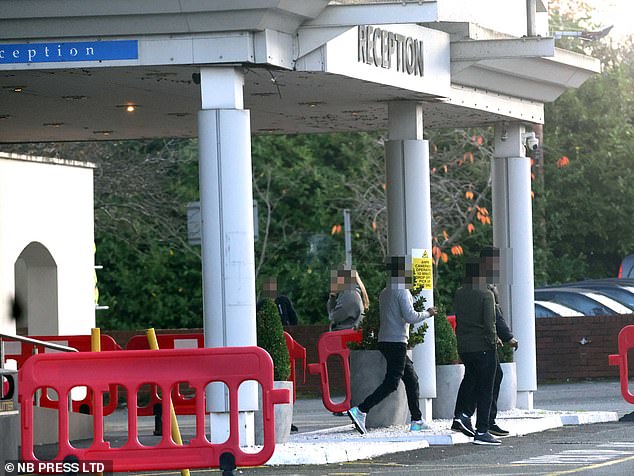
Migrants at a hotel in Cheshire earlier this year, the properties are paid for by the Home Office through contracts with private suppliers
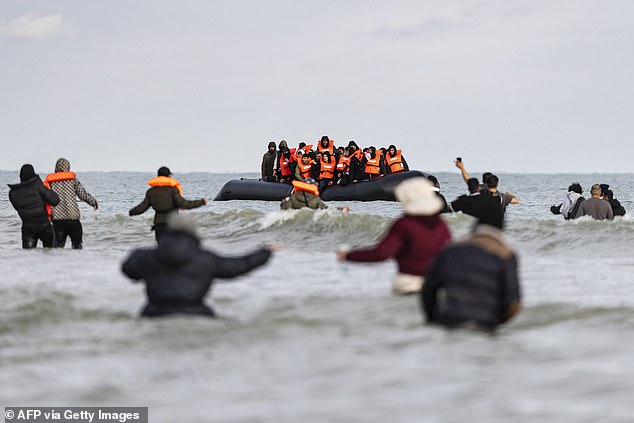
Migrants wave to a smuggler’s boat in an attempt to cross the English Channel, on the beach of Gravelines, near Dunkirk, northern France on April 26, 2024
In 2023, refugees and asylum seekers (those applying for refugee status) made up around 11 per cent of all immigrants to the UK.
Alp Mehmet, of Migration Watch UK said: ‘Claiming asylum is now a sure way of getting to stay in the UK, whether or not asylum is granted. Migrants and their lawyers know this.
‘That is why the numbers will continue to grow, impacting more and more communities. Rushing through claims while looking for cheaper accommodation will simply add to the numbers claiming asylum.
‘Keir Starmer and Yvette Cooper’s naive approach to the issue has put rocket fuel under the problem they inherited. It’s time they broke out of their make believe world and came up with realistic solutions.’
It comes as the National Audit Office (NAO) revealed this week that the total cost for asylum accommodation will cost the taxpayer £15bn over 10 years.
The overall bill is more than triple the Home Office’s original estimate.
Contracts were originally projected to cost £4.5bn over a decade from 2019 but are now expected to run to £15.3billion over same period. That equates to £4.2m a day.
The contracts are ran by three suppliers – Clearsprings Ready Homes, Mears Group and Serco.
They are responsible for finding a range of self-catering accommodation for asylum seekers and for sub-contracting hotels.
At the end of December 41,000 asylum seekers were in Home Office ‘contingency accommodation’, including 38,000 in hotels.
The figure also included 735 people in large sites built by the previous Conservative government, including former RAF base Wethersfield, in Essex, and Napier former barracks in Kent.
Separately, there were 66,000 asylum seekers in ‘dispersed accommodation’, which is mainly self-catering houses and flats.
In addition, 2,000 asylum seekers were in ‘initial accommodation’.
The NAO’s breakdown also showed that at the end of last year 4,000 failed asylum seekers were still being provided with taxpayer-funded accommodation because they had shown they were ‘destitute’.
Mr Bate said: ‘Today’s asylum system is overburdened and underperforming, with huge backlogs caused by administrative and legal processes.
‘We need a dramatic increase in detention capacity, along with a loosening of legal chokeholds, to ensure the public are sheltered from these indefensible costs.’
The Home Office currently has 210 asylum hotels in operation compared with a peak of more than 400, it is understood.
Labour has closed 23 hotels since the general election and a further seven will shut by July.
Earlier this week it emerged the Home Office is poised to unveil plans to scale back the number of work and study permits handed to nationals who are more likely to go on to claim they are a refugee.
The measures will feature in an immigration white paper due to be published next week.
A Home Office spokesperson said: ‘As these figures show, we inherited an asylum system in chaos with tens of thousands stuck in a backlog, claims not being processed and disastrous contracts that were wasting millions in taxpayer money.
‘We’ve taken immediate action to fix it – increasing asylum decision making by 52 per cent and removing 24,000 people with no right to be here, meaning there are now fewer asylum hotels open than since the election.
‘By restoring grip on the system and speeding up decision making we will end the use of hotels and are forecast to save the taxpayer £4 billion by the end of 2026.’












